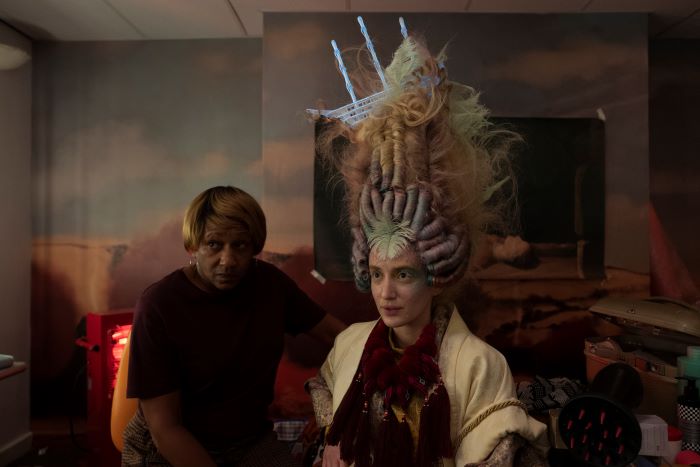A murder mystery set within the world of a British hairstyling competition is a splendid, intriguing setup, yet Thomas Hardiman’s debut feature is much more somber, staid, and morose than one might expect. A brutal scalping of a stylist backstage leaves the models and other hair designers stunned, and on lockdown in the building where the competition was to be set. This addled band wanders throughout rooms, fretfully speculating who the killer could be, but also sharing their frustrations and resentments—their hard work suddenly blunted—and details of their own mostly unglamorous, hardscrabble lives. The audience could assume police detectives are in the midst of piecing together the crime, but they remain unseen, amplifying the sense of meandering unease.
Enlisting cinematographer Robbie Ryan, a frequent collaborator with directors Ken Loach and Yorgos Lanthimos, is an ideal choice for this milieu—oscillating between the tones of Loach’s intimate working-class dramas and Lanthimos’s more extravagant works. Medusa Deluxe harnesses both the unglamorous, dour-edged realism of the hairdressers and the lavish flourishes of their creations. The movie is boldly assembled with the feeling of one continuous shot—an impressive feat that shows off its inherent cinematic cleverness, but a decision that sometimes flattens the momentum.
In some ways, Medusa Deluxe could possibly be even more impactful in a stage setting. The rhythms of the dialogue, the heightened intonation of the actors, the settings, and the real-time feel are all conducive to theater. The whodunit itself isn’t really the story’s grand centerpiece, and one looking for a surprising conclusion may be disappointed. Instead, the film is more about the characters’ lives and behavior. Smartly, it begins in the aftermath of the murder with a key opening scene, set in a backstage dressing room, where one of the hairstylists, Cleve (Clare Perkins), gives a bristly monologue about not being able to participate in the competition, now halted because of the gruesome incident. Later, another stylist, while holding a baby, remarks to herself in a mirror that she spends so much time looking at other people, she sometimes forgets to look at herself. These asides in Hardiman’s script are particularly acute and insightful about the characters and their labor.
A haunted, claustrophobic atmosphere hangs over the film. Visually, the drab rooms, with their light-bulbed mirrors, glow with a bronzed burnish and are a sharp contrast to the elaborate hairstyles (some hastily unfinished). The film also brims with foreshadowing and foreboding undertones of death—the score by Koreless, aka electronic musician Lewis Roberts, crackles with curdled percussion and moody synth pads. In the more extravagant sequences, there’s suddenly a kicky exuberance that one might wish the movie had more of. The sequin-studded disco digressions at the end, one set to the gospel-tinged stomper “Stand on the Word” by the Joubert Singers, recall the irony of a Bob Fosse musical number. One of the best moments follows a model in unlit corridors as a skewed, glow-in-the-dark miniature of the 1791 French ship Orient rests atop her wig. The comic yet bitter-toned moments are what make Medusa Deluxe more involving—when it breaks away a bit from its rampant dreariness.







Leave A Comment